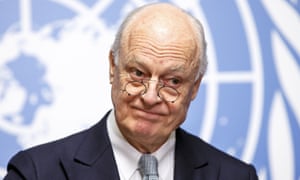Editorial
Link
There can be no more urgent matter than putting an end to the terrible human tragedy and the lethal regional destabilisation produced by the Syrian conflict. This is a war in which 300,000 people have died, which has internally displaced half the country’s population and which has caused more than 4 million to flee the country altogether. Syria has become the worst humanitarian catastrophe of our time. The plight of its people is also dangerously destabilising Europe and exposing weaknesses in its institutions. If the humanitarian crisis were not enough on its own, then the need to resolve Europe’s refugee crisis at its source would be reason enough to pay close attention to the peace talks that are scheduled to begin on Friday in Geneva. Yet even getting everyone round the table is looking fraught.
In the current climate, the stated aim of the talks appears breathtakingly ambitious. Mandated by a UN resolution passed in December, their purpose is to organise a gathering of representatives of both the Assad regime and opposition groups, in the hope that it could eventually lead to the formation of a new government, and later, elections. At this stage of a devastating war, it is tempting to see the very possibility of talks as an achievement in itself. Yet for several reasons there is a danger that they amount to nothing more than fake diplomacy.
First, the question of protecting Syrian civilians has all but fallen off the agenda. There can be no progress without attention to their plight. Second, western powers seem to have made key political concessions to Russiaand Iran, the main enablers of the Assad regime. As as result, the Syrian dictator will feel even more empowered to pursue the mass targeting of his own countrymen and to continue a war of attrition in the belief that he will ultimately come out the winner.
Diplomacy is invariably a slow process. There will always be setbacks, doubts and negative headlines. The Iran nuclear deal took years of patient effort; so did Barack Obama’s breakthrough with Cuba. But diplomacy is not just a talking shop, nor can it be reduced simply to putting people in a room, or scheduling summits. Ultimately, it hinges on substance, and there is a sneaking feeling now that the Obama administration may be elevating process over and above substance – in effect, marking time, as it enters its final year, rather than addressing the core reasons why the war has raged on for so long.
UN resolutions calling for the end of barrel bombing, to the sieges that left the people of Madaya and other towns at risk of starvation, and to the other mass atrocities that Syrians have been subjected to mainly by Assad’s army, have been all but swept under the carpet as the prospect of talks grew closer. Opposition groups have objected to holding talks if those demands are not met: that hardly counts as maximalist obstructiveness. Yet the US administration has reportedly tried to pressure them by threatening to cut off assistance. That is not a good backdrop to building trust, let alone to forging a sustainable agreement.
Meanwhile, Russia and Iran are demanding that the opposition’s delegation to Geneva is modified to include elements approved by the Assad regime and favourable to their own interests. If the US and its allies do not reject this demand, it will in effect kill the legitimacy of the delegation in the eyes of Syrians themselves, and thwart any hope of a genuine negotiation. What’s more, the US secretary of state, John Kerry, has spoken of a “national unity” government for Syria, not a “transitional” one. That vocabulary not only mimics Russia’s but runs counter to the very document on which the talks are meant to build: the 2012 Geneva communique calling for a political transition by mutual consent. Washington has even stopped saying Bashar al-Assad should not be allowed to run in elections.
If there is to be any hope for peace in Syria, talks must have a solid basis. After the setbacks it has recently endured, it must seem easy to pressure the opposition. But the proper place for pressure is on Mr Assad’s backers in Moscow and Tehran. Washington seems to believe that Russia will ultimately back a settlement inSyria that would sideline Mr Assad and that its cooperation must be sought under any circumstance. Yet Russia has so far appeared to be more intent on undermining talks than on enabling them. Worse still, letting Mr Assad get the upper hand will only fuel the Isis myth that it alone can defend Sunni Muslims. Talks for the sake of talks may give an illusion of progress but they come at a high price for Syrians, and western security too. Fake diplomacy is no diplomacy.
Fake diplomacy is no diplomacy.
 Fake diplomacy is no diplomacy.
Fake diplomacy is no diplomacy.
No comments:
Post a Comment